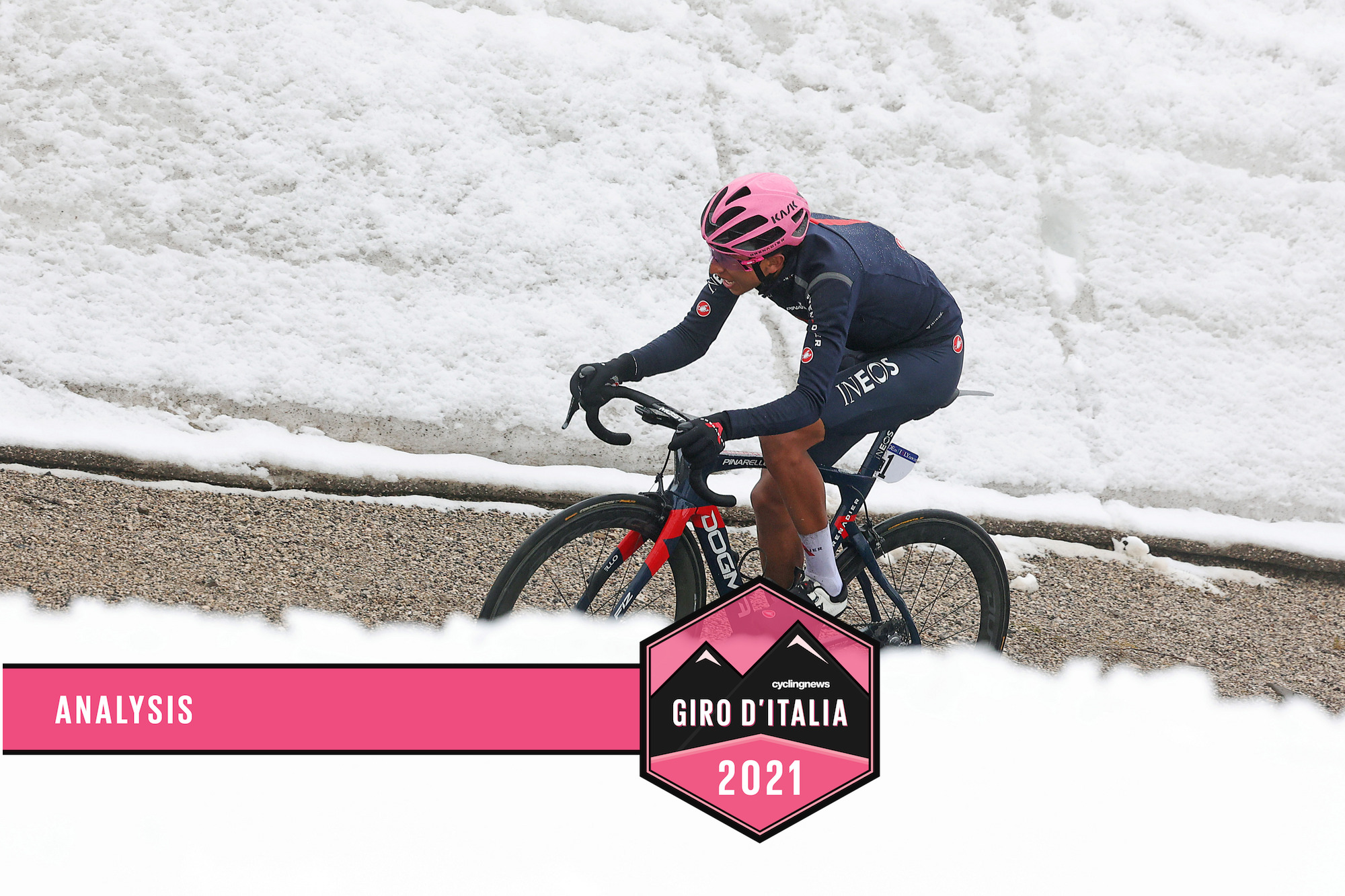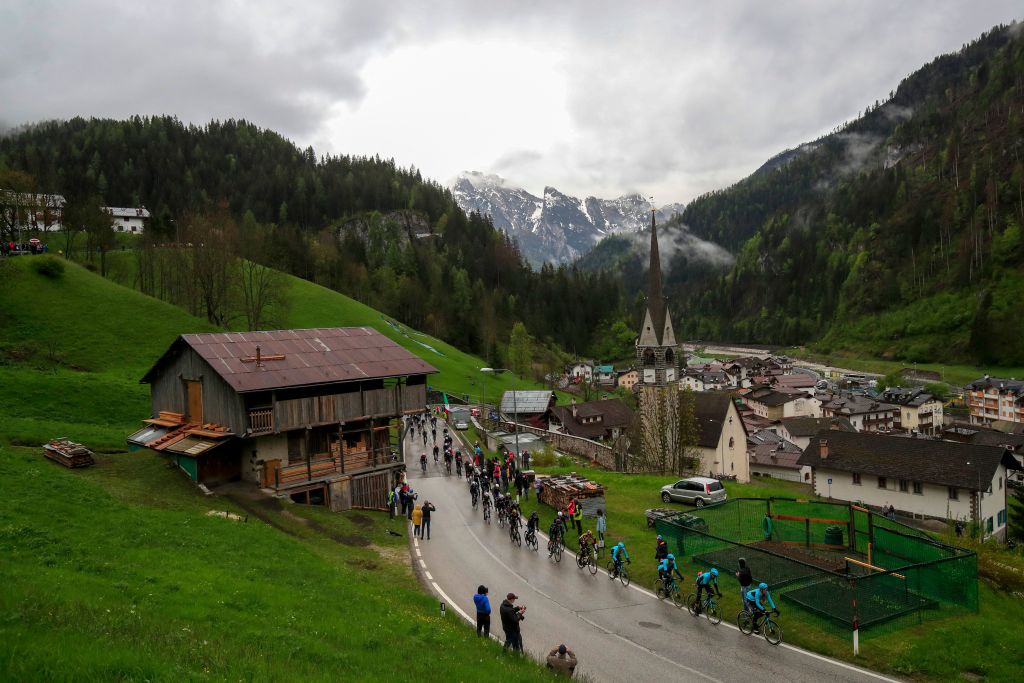Analysis: Egan Bernal ends all arguments at the Giro d'Italia
Debate over shortened stage 16 moot as pink jersey solos clear on the Giau

A little over three kilometres from the top of the Passo Giau, amid pellets of rain and plummeting temperatures, the 2021 Giro d’Italia climbed above 2,000 metres for the first time. The moment of truth had arrived, and Egan Bernal (Ineos Grenadiers) didn’t even need to climb from the saddle to grab it.
One seated acceleration was enough to put him clear of his few remaining rivals on stage 16, and within a few hundred metres, Bernal had zoomed past the remnants of the day’s break to boot.
By then, host broadcaster RAI’s camera link had broken down, and the rest of the stage – barring the closing metres in Cortina d'Ampezzo – had to imagined by a live television audience rather than watched, but maybe they didn't need to see much more.
The image of ‘un uomo solo al comando’ is inscribed in the DNA of this race, after all, and the man alone in front here was hardly a surprise. Bernal was the Giro’s strongest rider across the hilltop finales of the Apennines and the strongest rider on the gravel of Tuscany. It perhaps only stood to reason that a man who grew up in Zipaquira, 2,650 metres above sea level, would be the strongest rider up here too.
From his position aboard a motorbike in the race convoy, Italian national coach Davide Cassani delivered sporadic updates on RAI of the whereabouts of Bernal’s rivals, and the on-screen graphic provided temperamental GPS updates.
In truth, Bernal told us all we needed to know about the time gaps with the unhurried way he divested himself of his jacket and rolled up underneath his maglia rosa on the finishing straight. A few seconds here or there didn’t matter very much now that the decisive blow had already been dealt. Bernal could easily afford to behave as though he were stepping through his front door after the commute from the office.
As the Giro breaks for its second rest day, with just five stages and 800 kilometres left to Milan, Bernal holds a lead of 2:24 over Damiano Caruso (Bahrain Victorious), 3:40 over Hugh Carthy (EF Education-Nippo) and more than four minutes on Aleksandr Vlasov (Astana-Premier Tech) and Simon Yates (Team BikeExchange).
The latest race content, interviews, features, reviews and expert buying guides, direct to your inbox!
The day began with one of those old storylines that repeats itself fiercely almost every year at the Giro. Heavy rain and frigid temperatures atop the Passo Fedaia and Passo Pordoi had seen the climbs removed from the route of the Giro’s toughest stage after lobbying from the riders’ association, the CPA.
Familiar complaints about a neutered tappone and a diminished Giro were inevitably dusted off, but as the afternoon wore on, it was clear that the debate was entirely moot. Bernal’s superiority on the Passo Giau brooked no argument. The travails of men like Yates, who lost 2:37 on the day, or Remco Evenepoel (Deceuninck-QuickStep), who conceded 24 minutes, would surely only have been worse had they been subjected to the full 212km of racing and 5,700m of climbing that had been originally planned. This wasn’t the promised tappone, but it was a real stage.
Bernal confessed afterwards that he would have preferred to have raced the Dolomite tappone in its grandiose entirety, rather than this abridged, 153km version that skirted around the Fedaia and Pordoi rather than scaling up them. Yet despite the pink jersey on his shoulders, he appears to be a padrone who expresses his dominance on the results sheet, rather than through the force of his personality.
“In the end, it wouldn’t have been right to go against what other riders wanted even if for me it would have been fine to do the whole stage,” said Bernal. On Monday’s evidence, they could have ridden the whole stage in a car park in Sacile, and he still would have won.
The Giro isn’t over – that bears underlining – but in the entire history of the race, few riders of Bernal’s pedigree and palmarès have ever squandered a position of dominance like this one. Hugo Koblet in 1953 springs to mind, but it still took Fausto Coppi and the Stelvio to divest him of pink on the final weekend. Something very special, in other words.
The CPA, RCS Sport, and the stage alteration

The sight of Giro director Mauro Vegni in discussion with riders and CPA representative Cristiano Salvato amid driving rain at the start in Sacile brought back memories of that contentious and abortive start in Morbegno last October. That day, the peloton successfully lobbied for the mammoth, flat stage to Asti to be halved in distance, but they faced fierce criticism afterwards, not least from Vegni.
On Monday, bar a half-hearted attempt to whip a polemica on RAI’s Processo alla Tappa post-stage show, the response was rather less polarised. Bernal’s superiority undoubtedly helped to quell the arguments, but so too did the general context.
Last October, the Giro was drawing towards the end of a tumultuous edition that had seen two teams leave due to COVID-19 cases and one more call for an early end to the race. After navigating those hurdles, the Morbegno strike was viewed by some in Italy as an affront to the Giro and, perhaps by extension, the country itself. It didn’t help either, that the riders’ concerns were articulated so incoherently by the CPA.
This time around, the lines of communication between the CPA and RCS Sport appeared to be clearer, as did the willingness to compromise on each side, even if Vegni noted afterwards that the criteria to apply the UCI’s Extreme Weather Protocol had not been met.
“People are saying that riders wanted to race the full stage, but you’ve got to understand if that’s true,” Vegni said. “When the rumours start flying between riders it’s difficult to control them, so we decided not to do the climbs that the riders had asked us to avoid. We didn’t want to see the scenes of the past, but to have a real race to Cortina.”
For their part, the CPA issued a statement after the stage, noting that talks had begun on Sunday.
"Working with RCS Sport, the CPA ensured that riders’ voices could be heard and that riders got to the finish line without taking too many risks," Salvato said. "We consulted with all the riders' representatives and the majority demanded a change in the route.
"We apologise for the fans who were waiting for us on Fedaia and Pordoi. Those who ride bikes know what it means to face long descents in wet and cold weather at altitude. The athletes honoured the race and put on a show. From the first kilometre over the Passo Giau and the descent to the finish, it was a real race."
In any case, Vegni can surely have no complaints about the quid pro quo. The shortened stage was marked by early aggression from Vincenzo Nibali (Trek-Segafredo), Dan Martin (Israel Start-Up Nation) and João Almeida (Deceuninck-QuickStep), while the pink jersey group was whittled down to its bare bones on the Passo Giau.
Nobody was going through the motions here, and credit is due to EF Education-Nippo, who took up the reins from Ineos Grenadiers ahead of the Giau in a bid to make the race as difficult as possible. They didn’t manage to set up stage victory for Carthy, but the Briton is now up to third place.
“I hope the TV pictures will make it out some day because it was a good race,” EF Education-Nippo directeur sportif Charly Wegelius said afterwards.
Even so, it is possible to support the riders’ appeal to shorten the stage while empathising with Vegni’s predicament. Despite the UCI Extreme Weather Protocol, the red lines for the shortening or cancellation of races are still unhelpfully blurred. And with the climate crisis ever more evident, will the Giro simply have to forgo higher altitudes in the future or perhaps even shift to a later date? That debate, clearly, will run on.

Barry Ryan was Head of Features at Cyclingnews. He has covered professional cycling since 2010, reporting from the Tour de France, Giro d’Italia and events from Argentina to Japan. His writing has appeared in The Independent, Procycling and Cycling Plus. He is the author of The Ascent: Sean Kelly, Stephen Roche and the Rise of Irish Cycling’s Golden Generation, published by Gill Books.